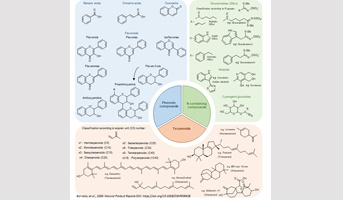Specialized Plant Metabolites and Agriculture
Plants produce various specialized metabolites grouped into three major categories: terpenoids, alkaloids, and phenolic compounds. Some of these compounds play key roles in plant life, protecting them against diseases, pests, and abiotic stresses, or facilitate their interactions with beneficial or symbiotic organisms. This potential for specialized metabolites is generating growing interest for agroecological and industrial applications, particularly in the context of climate change and the development of more sustainable agriculture using fewer synthetic inputs.
However, these compounds are only characterized in a few species, and many aspects, such as their biosynthesis, transport, and regulation, remain poorly understood, particularly due to technical reasons (e.g., low quantities, complex chemical structures). Furthermore, it is now established that the domestication and subsequent improvement of plants have intentionally or unintentionally led to a drastic decrease in the quantity and variability of these metabolites in plants and their products.
Nevertheless, recent advances in the understanding of these metabolites and the development of new plant improvement techniques make it possible to consider reintroducing or optimizing the quantities of some of these compounds in cultivated plants in a rational manner. This offers perspectives for benefiting from their positive impacts in agriculture and for the quality of plant products, for both food and industrial uses.
Moderators
> Loïc Lepiniec, Corresponding member of the Academy, leader of the "Seed Development and Quality" SEEDEV team
> Michel Dron, Full Member of the Academy
Programme, link
With “Diversity, Plasticity, and Role of Specialized Metabolites in Seeds” by Massimiliano Corso, "Seed Development and Quality" SEEDEV team, IJPB, Versailles, abstract
In connection with the research developed at the Institute Jean-Pierre Bourgin for Plant Sciences.
Back
